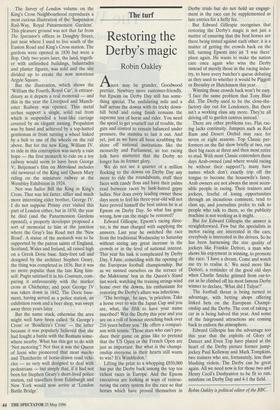The turf
Restoring the Derby's magic
Robin Oakley
Acot may be grander, Goodwood prettier, Newbury more customer-friendly, but Epsom on Derby Day still has some- thing special. The undulating mile and a half across the downs with its tricky down- hill bend and rising finish remains the supreme test of horse and rider. You need the speed to get yourself out of trouble, the guts and control to remain balanced under pressure, the stamina to last it out. And ' yet, just as we have all been scrubbing the shine off national institutions like the monarchy and Parliament, so too racing folk have muttered that the Derby no longer has its former glory.
We do not see a quarter of a million flocking to the downs on Derby Day any more to ride the roundabouts, stuff their faces with candy floss and have their palms read between races by lank-haired gypsy ladies. Nor does every leading owner these days seem to feel his three-year-old will not have proved himself the best unless he is at Epsom on Derby Day. So what has gone wrong, how can the magic be restored? Edward Gillespie, Epsom's racing direc- tor, is the man charged with supplying the answers. Last year he switched the race from the traditional Wednesday to Saturday without seeing any great increase in the crowds or in the level of national interest.
This year his task is complicated by Derby Day, 8 June, coinciding with the opening of the European football championship. But as we sunned ourselves on the terrace of the Maktoums' box in the Queen's Stand last week, watching the training strings wind home over the downs, his enthusiasm for restoring the Derby's allure was infectious.
'The heritage,' he says, 'is priceless. Take a horse over to win the Japan Cup and you are, what, the fifth to have your name inscribed? Win the Derby this year and you are on a roll of honour stretching back over 216 years before you.' He offers a compari- son with tennis: 'Those stars who can't pro- duce their game on grass like to pretend that the US Open or the French Open are just as important. But what is the champi- onship everyone in their hearts still wants to win? It's Wimbledon.'
Lifting the prize to a whopping £850,000 has put the Derby back among the top ten richest races in Europe. And the Epsom executives are looking at ways of restruc- turing the entry system for the race so that horses which have proved themselves in Derby trials but do not hold an engage- ment in the race can be supplemented as late entries for a hefty fee.
But Edward Gillespie recognises that restoring the Derby's magic is not just a matter of ensuring that the best horses are there being tested against each other: it is a matter of getting the crowds back on the hill, turning Epsom into an 'I was there' place again. He wants to make the nation care once again who wins the Derby instead of merely those in the racing indus- try, to have every butcher's queue debating as they used to whether it would be Piggott or Breasley or Hutchinson this year.
Winning those crowds back won't be easy. 'I face the same problem that Tony Blair did. The Derby used to be the close-the- factory day out for Londoners. But there isn't a working class any more. They're all driving off to garden centres instead.'
There are other problems too. Flat rac- ing lacks continuity. Jumpers such as Red Rum and Desert Orchid may race for seven or eight seasons. Top Classic per- formers on the flat show briefly at two, run their big races at three and then most retire to stud. With most Classic contenders these days Arab-owned (and where would racing be without their support?), many have names which don't exactly trip off the tongue to become the housewife's fancy. Arab owners are not always the most acces- sible people in racing. Their trainers and jockeys, fearful of losing opportunities through an incautious comment, tend to clam up, and journalists prefer to talk to people who talk to them, so the publicity machine is not working as it might.
But for Edward Gillespie the answer is straightforward. Few but the specialists in motor racing are interested in the cars; everybody is interested in the drivers. So he has been harnessing the star quality of jockeys like Frankie Dettori, a man who shows his enjoyment in winning, to promote the race: 'I have a dream. Come and watch me try to realise it.' We need more like Dettori, a reminder of the good old days when Charlie Smirke grinned from ear-to- ear as he climbed off his most famous Derby winner to declare, 'What did I Tulyar?'
The football threat is being turned to advantage, with betting shops offering linked bets on the European Champi- onship and the Derby. The cost of taking a car in is being halved this year. And some of the fairground attractions are coming back to enliven the atmosphere.
Edward Gillespie has the advantage too this year that the exploits of Glory of Dancer and Even Top have placed at the heart of the Derby picture former jump- jockey Paul Kelleway and Mark Tompkins, two trainers who are, fortunately, less than blushing violets. The Derby can be great again. All we need now is for those two and Henry Cecil's Dushyantor to be fit to run, sunshine on Derby Day and 4-1 the field.
Robin Oakley is political editor of the BBC.


























































 Previous page
Previous page